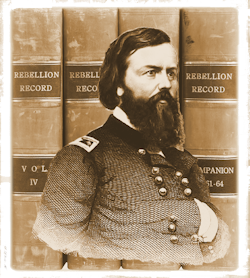March 14.—An order was unanimously adopted, in the Massachusetts House to-day, authorizing the construction of one or two iron-clad steamers, on the plan of Ericsson’s Monitor, for the protection of the harbors of the State.
—Gen. Stoneman, Chief of Cavalry, with a force of about fifteen hundred cavalry and eight hundred infantry, made a reconnoissance this day, extending from Manassas up the Orange and Alexandria Railroad to Cedar Run. At that point they came across the rebel pickets, whom they drove over the run to a large force of the insurgents, who made no attempt to follow Gen. S., on his return toward Manassas. The rebels had burnt the Cedar Run bridge, and the bridge at Bristow, but not otherwise injured the railroad. The roads travelled over by the reconnoitring force were found strewed with hats, caps, muskets, blankets, ammunition, knapsacks, broken and abandoned loaded wagons, etc., confirming all other evidence that the retreat of the rebels was made under a panic.—(Doc. 92.)
—Early this morning, after several days’ skirmishing, and a number of attempts, by the rebel gunboats, to dislodge Gen. Pope, at Point Pleasant, Mo., the rebels evacuated their works at New-Madrid, leaving all their artillery, field-batteries, wagons, mules, and an immense quantity of other property of the greatest value. The rebels abandoned their works so hurriedly as to leave all the baggage of the officers, and knapsacks of the men, behind. Their dead were unburied. Their suppers were on their tables, and their candles were burning in their tents. The operations of Gen. Pope’s army, which led to the evacuation, were as follows: A heavy battery was established during the night of the twelfth inst, within eight hundred yards of the enemy’s works, and opened fire at daylight on the thirteenth inst. During the whole day the National lines were drawn closer around the works of the enemy, under a furious fire of sixty pieces of artillery, and the fear of an assault upon their works at daylight induced them to flee during the night. Many prisoners were taken, and the colors of several Arkansas regiments. The National loss during the siege was about fifty killed and wounded.—(Doc. 93.)
—Gen. McClellan issued a brief, spirited, and most telling address to the Army of the Potomac. He tells his troops, and through them the people, the purpose of their inaction. They were to be disciplined, armed and instructed, and the formidable artillery they now have created, and other armies were to move on and accomplish certain results, in order that the Army of the Potomac might give the death-blow to the rebellion. These preliminary results are now accomplished, and the Army of the Potomac is pronounced a real army—”magnificent in material, admirable in discipline and instruction, excellently equipped and armed,” with commanders all that the General-in-Chief could wish. The period of inaction is passed, and the General promises to place his troops face to face with the rebels. He will gain success with the least possible loss, but does not disguise the fact that they have brave foes to meet. Further, he says that he will demand of the army heroic exertions, rapid and long marches, desperate combats and privations: The patience they have shown is wonderful, and their confidence in their General is unbounded. He trusts in them to save their country.—(Doc. 94.)
—The battle of Newbern, North-Carolina, was fought this day between a combined land and naval force of the United States under Gen. Burnside and Commodore Goldsborough, and a rebel force under the command of Gen. Lawrence O’B. Branch.
Day before yesterday, the National fleet left Roanoke Island, and entering the mouth of the Neuse River, landed the troops under cover of the gunboats yesterday morning at Slocum’s Creek. The men then marched some twelve miles up the river, and bivouacked for the night on the railroad, while the gunboats proceeded further up, and shelled a rebel battery.
This morning the march was again resumed, and the troops had proceeded but a short distance when the rebels were discovered. Their works consisted of a series of strong batteries, extending over a distance of two miles, and defended by about ten thousand men, with twenty-one guns in position, besides a formidable array of field artillery. The batteries of the enemy were taken one after the other—the last and most formidable one, where the rebels had concentrated their whole strength, by a gallant bayonet-charge, in which the Massachusetts Twenty-first and the Pennsylvania Fifty-first figured conspicuously. The rebels then fled across the Trent River, destroying the bridges behind them, and having a sufficiency of cars at hand, made their escape in the direction of Goldsborough, leaving everything behind them, and about three hundred of their number as prisoners. They attempted to burn the town of Newborn before leaving it, but succeeded in doing very little damage, the citizens extinguishing the fires as fast as kindled. The Neuse River was obstructed by sunken vessels and chevaux-de-frise, which interfered with the operations of the gunboats. The rebels also had scows filled with tar and turpentine, at Newbern, to send down the river to burn the fleet, but the tide did not serve them as they desired, and the project failed. The National troops captured three light batteries of field-artillery, forty-six heavy siege-guns, large stores of fixed ammunition, and three thousand stand of small arms, and among the prisoners were one colonel, three captains and four lieutenants. They left a number of dead on the field, but as they carried off a large part of their dead and wounded, their loss cannot be known. The National loss is from ninety to one hundred killed, and about four hundred wounded.—(Doc. 95.)



